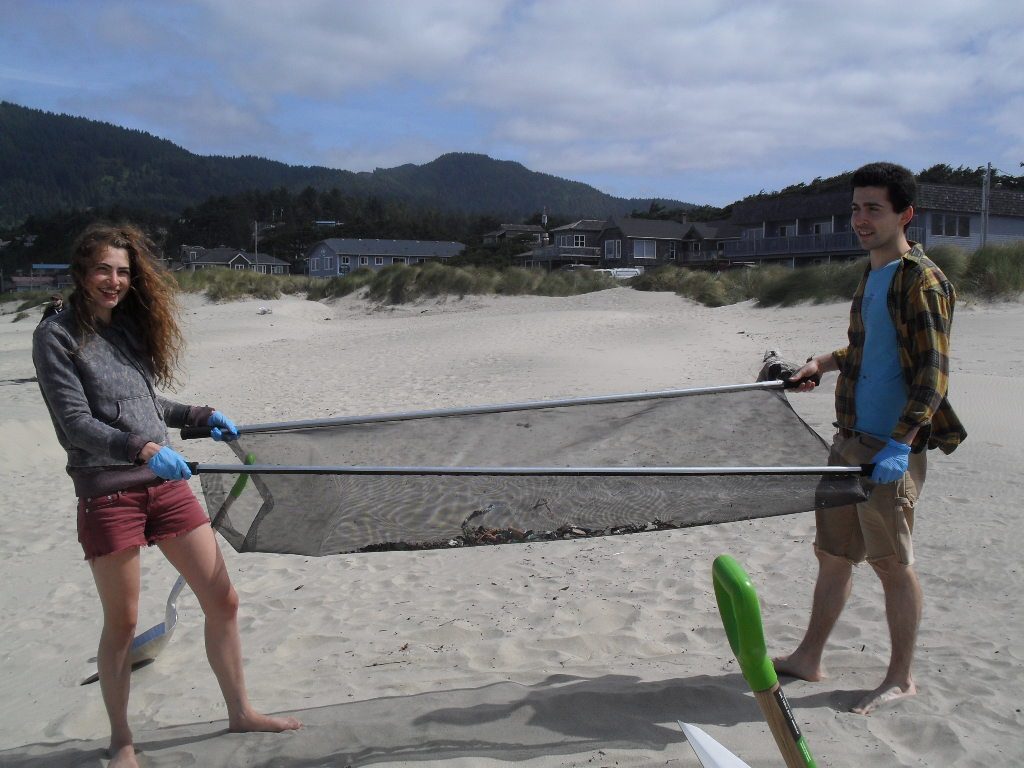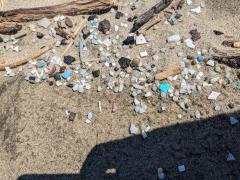By Leanna Coy, FNP
On a sunny Sunday morning in Rockaway Beach, volunteers trickle to a folding table at the Wayside to sign in for a beach cleanup. White plastic bags with the familiar SOLVE logo were handed out along with plastic gloves. The weather was perfect. Not too hot and only a light breeze blowing off the ocean. The volunteers and passers-by were handed pamphlets with information on the growing issue of microplastics. Microplastics are fragments of plastic smaller than 5 mm in length. Trash and large pieces of plastic are easy to identify and pick up. The microplastics prove more challenging. Brightly colored pieces stand out against the sand, but the less obvious small white, tan, or brown pieces can easily be confused for shells or rocks. Driven by the concern for microplastics contaminating our coastlines, a local resident has made it his mission to raise awareness and clean up the sand.
From Sea Turtles to Microplastics
Marc Ward has made it his life’s work to make the world a less toxic place. Born and raised on the Oregon Coast, he organized his first marine debris removal off the beach in 1976 for a high school biology class. Since then, Ward has doggedly worked to remove plastic debris from beaches worldwide. In college, he studied environmental physics, gaining an understanding of the importance of every little species.
While on a trip to Costa Rica, he witnessed a devastating amount of marine plastics piled on the tropical beaches and chose to begin cleaning them up. He formed a group of volunteers that began removing thousands of pounds of plastics and started his organization Sea Turtles Forever in earnest to help save sea turtles in Costa Rica.
During this time, he became aware of the harmful effects the plastics in the ocean were having on sea turtles. This led him to a 10-year research project meticulously logging the debris making landfall on beaches all over the world. The project’s results established a database that logged the garbage floating in the world’s oceans.
How Toxic are The Beaches?
Ward’s work on recording ocean garbage led to a collaboration with Tokyo University to collect plastic pellets from sites around the world and analyze them for toxicity. These pellets, called nurdles, were found to be highly contaminated with 150 pollutants and harmful chemicals. Typically, chemicals in the ocean are highly diluted due to the massive amount of water and are generally not a threat. However, plastics absorb the chemicals like sponges as they move through the ocean currents. “Each piece of plastic becomes a toxic pill,” notes Ward. When creatures ingest the nurdles, the chemicals leach out of the plastics into the creatures’ bodies. These same creatures are part of our food chain, passing the toxins on to humans.
Tokyo University also found the chemicals leach out of the plastics into the beach sand. Heat from the sun or warm weather speeds up this process. “If we leave stuff on the beach, we will eventually become contaminated with the chemicals,” says Ward. This concern about exposure to toxins on the beach hit close to home for Ward. In 2006, he was at Cannon Beach with his family, where he saw his first microplastic. “I look over, and my son, who is like one and a half, has a piece of microplastic in his finger, and it’s headed for his mouth. I stopped and told my wife we can’t allow this.”

Taking on Oregon’s Beaches
Ward began surveying the densities of microplastics on Oregon beaches, from Long Beach to Port Orford. He created screens that carry a small static charge to filter all the microplastics out of the sand one square meter at a time. The screens can filter plastic particles as small as 50 µm. Ward’s first survey with the filters was at Ecola Beach due to the high-density microplastic landfall there. That first year, they collected 50 grams per square meter of microplastics. Each year, the amount they collected increased exponentially. The numbers disturbed Ward enough that he decided to stop surveying the beaches and start cleaning them.
Expanding the size of his static-charged filters, he created a low-cost tool for two people to filter the toxic microplastics efficiently. With groups of volunteers, he can filter entire beaches. Ward has a team on Oregon beaches filtering five days a week during the summer. Ocean currents and headlands cause large amounts of microplastics to make landfall in the same locations every year. Ward notes Whale Park in Cannon Beach is one of the worst sites for microplastics in Oregon. Before the pandemic, their efforts pulled about 2500 lbs. of microplastics off the beach every year for 13 years. They did not clean the beach in 2020 due to the pandemic. The following year, they removed 5000 lbs. of the debris. “We filter this stuff out, and we make it pristine again. And next year, there is another (landfall),” Ward says. “It’s like a maintenance program. But we just keep going.”
To prevent the collected material from re-entering the ocean and washing up on the beach again, the debris is taken to a non-recyclable solid waste landfill. Ward says he would prefer to see the debris incinerated, but it is just too expensive to transport that much debris.
Back at the Rockaway Beach cleanup, one group of volunteers takes a break and compares their trash hauls. Socks, a whole pineapple, broken pieces of plastic beach toys, plastic dog poop bags, a golf ball, a tennis ball, and a butter knife were the larger items found. Most of the debris consisted of smaller items: cigarette butts, a lot of exploded firework pieces, and many unidentifiable microplastics. “I feel bad we can’t get more of the microplastics,” one volunteer lamented. “They are everywhere.”
There are many ways you can get involved. Ward says the number one thing people can do to reduce microplastics on the beaches is to use static-charged filtration screens. You can visit the Sea Turtles Forever website to join their Blue Wave response team or purchase a screen to do your own sand sifting for microplastics. This month, SOLVE is sponsoring its annual Oregon Spring Cleanup, which will be held from April 13 to 22. They also have events throughout the year. Visit their website to register for one of their events.


